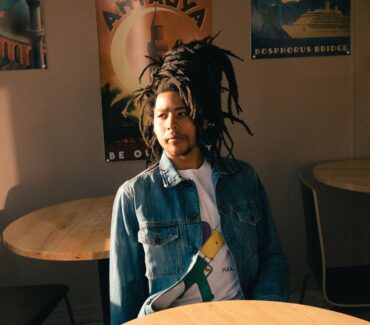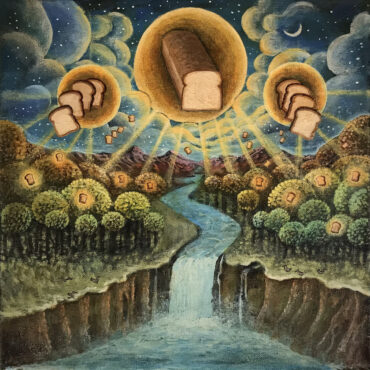
Photo Courtesy of Jymmy Kafka
On his new album Manna, there is a clarity in Jymmy Kafka’s voice as he takes you on an introspective and philosophical trip through his mind. The seven track album follows the release of his last album Lil Nothin’, which came out in collaboration with Rilla Force eight months ago. Since then, with the pandemic still raging on, Kafka decided to begin recording at home. “I hollowed out my closet and made a studio in there and learned how to produce and started recording myself. I had never done anything like that until now. It’s completely changed how I’ve been making music,” Kafka said. On his instagram, he noted the sales of Lil Nothin’ on his Bandcamp went directly to helping him build his home studio.
The album’s name (a reference to miraculous bread sent by God), feels fitting, as the tracks are healing and refreshing. Staying true to his eclectic roots, in his exploration of his own psyche, Kafka covers a multitude of topics ranging from the earth, to migrant children in cages, to Friedrich Nietzsche’s Thus Spoke Zarathustra, to Butoh, a form of traditional Japanese dance theatre. Manna’s laid-back beats are a different vibe from the bass-heavy, kinetic beats of his last album. Instead, chopped up samples, gentle pianos, jazzy drums, and wavy synths recur throughout. The instrumentation is restrained and downtempo for the most part, putting even more of an emphasis on Kafka’s interwoven verses.
On his writing process, Kafka said he usually just starts recording. “There was no pen-to-paper for a lot of it. I’ve never been able to do that…. It’s really opened up a lot” he said. His lyrics are as free spirited as he is, bouncing between stream-of-consciousness and meticulously calculated, but they are not always positive. Throughout Manna, tension is palpable on many occasions. At one point in “The Dance of Butoh” Kafka says “They tell you pull yourself up by your laces. Amazing that it’s in the same country that’s putting children in cages.”

Artwork By Benjamin Styer
Manna is packed with collaborators handpicked by Kafka including AJ Lasalle, DJ Lucas, Southside Jonesy, Premises, Manolo Husk, and Dillon Zupp. “I produced two of the songs and then it’s a mix of good friends and people I’ve met along the way,” Kafka told AP, also mentioning German collaborator Knut Funk, who he met online years ago and finally collaborated with for this project. It was great to hear the subtle differences between each of the producers’ styles and how they fit into Kafka’s lyrical flow. Of the collaborations, the feature on “Aurora Borealis” from Southside Jonesy & Premises is a high point of the album.
The music video for High Tides, which has yet to be released, is a slice of Jymmy’s life, featuring him skating around New York City. In addition to being a producer and rapper, Kafka is an avid skateboarder. The video was directed by friend and fellow skateboarder Kyber Jones, who he skates with often and met through Oyster. It gives listeners a glimpse into one of the many facets that make up Jymmy Kafka. Manna is Jymma Kafka at his most confessional. Staring full force to the future, working nonstop to evolve his sound and share his mind with the world.
Stream Manna now.
